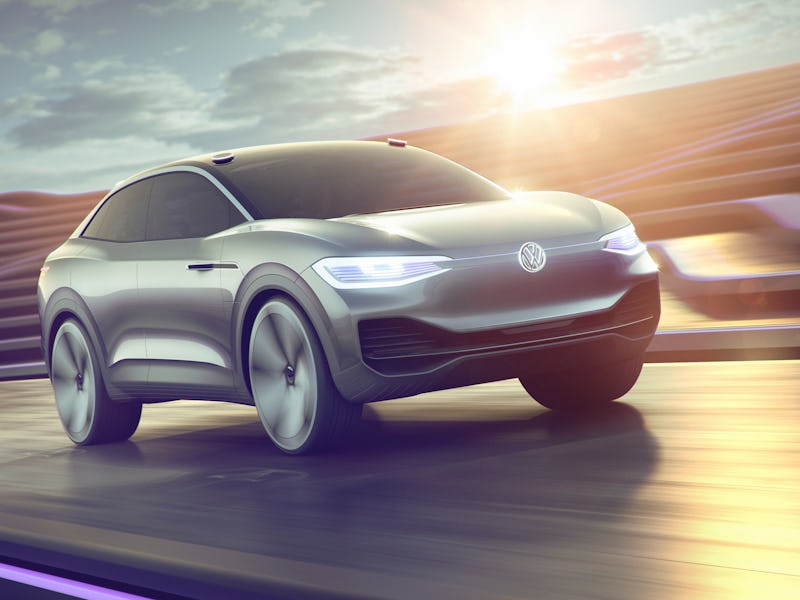Volkswagen is climbing out of the Dieselgate-tainted ashes of the internal combustion market and going all electric, taking aim at Tesla with a new line of affordable, eco-friendly vehicles.
At the Auto Shanghai 2017 Show on Tuesday, Christian Senger, the head of Volkswagen’s electric car project, showed off VW’s battery-powered crossover and announced that the company has made “huge progress” in reducing the cost of making electric vehicles. Volkswagen has also invested in a network of superchargers across the United States, reduced the production costs for its electric cars, and announced a line of four electric cars, including a Model X SUV competitor, that will be released starting in 2020.
“Offering our electric cars for prices similar to combustion engine vehicles really is a game changer,” Senger said, according to Bloomberg.
The I.D. Crozz concept illustrations get a bit wild.
In Shanghai, VW displayed the I.D. Crozz, a crossover concept that should start production in 2020. The 311-mile range and 112 mph top speed make it sound like a normal car, but the I.D. Pilot autonomous driving system that comes with it puts it in direct competition with the Tesla Model 3. Although the I.D. Crozz is not priced yet, the similarly-sized VW Tiguan small SUV sits at a pretty $25,000. That’s $10K under the starting price tag on the Tesla Model 3 (which doesn’t get you the full Tesla experience.) And for an electric SUV, that’s pretty game-changing.
The VW electric car line-up features four different vehicles in the I.D. line that include the I.D. Crozz crossover, the I.D. Buzz Van, a hatchback, a sedan, and a mid-sized SUV. The cars will be partially developed in China, Bloomberg reports. Audi, a part of the VW group, expanded into the Chinese electric car market to take advantage of the subsidies offered there, and sets up the whole group to better compete with Tesla overseas.
Along with the cars, VW is also building its own network of superchargers across the United States, with 450 chargers in working order by mid-2019. The chargers will be installed in 39 states along highway corridors and a number of major cities. This $300 million investment is part of the VW Dieselgate settlement, which required the company to put $2 billion into zero-emissions technology projects. And it looks like VW decided that the best way to turn a scandal into a success would be to double down on clean energy and take Tesla head on. Senger told Bloomberg, “we’re using the need to step from combustion engine to electric cars to reinvent VW brand.”
While Tesla remade the image of electric cars from dinky golf-cart vehicles that couldn’t go over 30 miles an hour to super fast luxury vehicles, Volkswagen is taking that perception one step further. We’re not talking little and fast anymore, as electric is on its way to meaning big, durable, and cheap.
